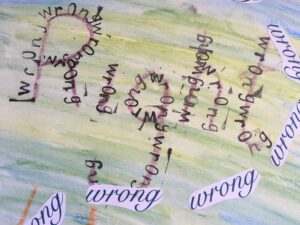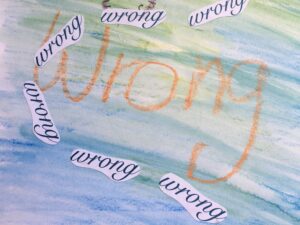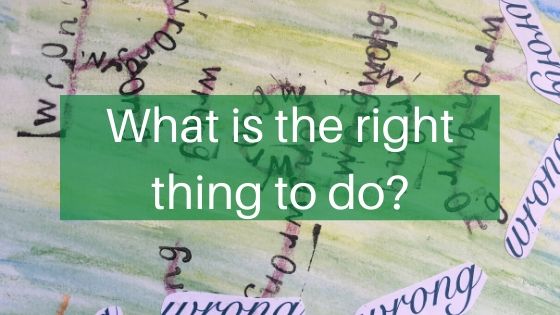I have always admired the people in life who speak up, who dare to tell their truth regardless of what you or I may think. Rosa Park said:
“You must never be fearful about what you are doing when it is right.”
But, how the heck do you know what is right?
A concept
I have wrestled with that question most of my life. I’ve driven myself mad, others too, trying to figure it out. I had no idea that to be right, is a subjective state. Rightness depends on so many different things, it is not a definitive, it’s more of a concept which has to be weighed against something else.
According to the dictionary it’s about “what is good, proper, or just” or “in conformity with fact, reason, truth, or some standard or principle; correct.”
For many years I missed the complex nature of rightness. This philosophical conundrum caused me a huge amount of grief because I believed there were clear-cut answers out there and I tried to find them. Let me explain.
Learn to pretend
To survive my childhood I learned to distrust my own thinking and feelings. My eyes, ears and gut instinct told me one thing but the grown-ups told another story. They lied, even when it was blatantly obvious what was going on. This is common in abusive/alcoholic homes. The real problem is ignored and the family learn to pretend it isn’t there. Eventually you forget and begin to act like the abnormal is normal.
‘The past was erased, the erasure was forgotten, the lie became the truth.’
George Orwell, 1984
I became totally confused about what was actually true. It was definitely safer to believe the lies and pretend things were not as they seemed and challenging or questioning was basically forbidden.

What was right
Sometimes in therapy I had to repeat things over and over in an attempt to convince myself that what I thought went on, did go on. Confused? I was.
Instead of developing a strong sense of self I learned not to trust my own thoughts and ideas. I drove myself insane trying to figure out what was right. Decision making was torturous. I would continuously check things out with others, trapped in a what-is-right-what-is-wrong anxiety loop. It was exhausting.
Wrong
It has taken a very long time for me to find a way through this. I still lapse into indecision often. Daring to speak my truth in the world felt impossible because I had no confidence in what I thought, felt or believed. Constantly on red alert I waited to get into trouble, to be told I was wrong and that I didn’t know what I was talking about.
Get back in the denial box Mairi, and stay there, that’s an order!

Therapeutic input
When I first started going to a support group for people affected by someone else’s drinking I felt like a phoney. I was so deep in denial I had lost sight of what had happened to me. I made myself wrong for thinking my Dad might have a drink problem, that my Mum was mental unstable. It took a lot of therapeutic input and group support to help me to slowly unravel all that damage.
Eventually I came to realise that it wasn’t me, nothing was inherently wrong with me. The problem lay in what had happened to me. The mind games of my childhood left me very confused, scared and distrustful of everyone, including myself.
It depends
Over the years I gradually learned that what is right and what is wrong all depends. It depends on the context, on the country, culture, religion, community and of course the daily values and norms we live with. These things can be debated till the cows come home and then some. Philosophy thrives on these conundrums.
The upshot of all my therapeutic investigations is this. I finally realised what is right depends on what I decide is right for me. What is right for you depends on what you decide is right for you. It may not be the same. Sometimes it might not even be the same as the law!
Inner compass
It is about checking in with my own inner compass. Hidden under all those layers of doubt I rediscovered my ability to listen within, to what feels right for me. I have reconnected with my intuition, that inner knowing which can guide and steer me through life.
Sometimes I know exactly why and can back my decisions up with facts and figures; good reason. At other times it’s a feeling, a sense of something which I am learning to honour. Self trust means I have become my own good friend. I am never alone because I have myself back. It’s a good feeling.
Doubt
Of course I wobble sometimes and doubt myself and I can still turn myself inside out trying to figure out the “right” answer. This is when I need to remember and practice Radical Self Care.
I believe I am here with a part to play in this interconnected whole to which we all belong. When I take good care of myself I become clear about the “right” path for me, my part in the healing of our world. We all have this capacity. The more we heal and free ourselves from unhelpful, unresolved issues from the past, the better we turn up for the job in hand.
To practice Radical Self Care is to do what is right, in my opinion, of course!
“In any moment of decision, the best thing you can do is the right thing, the next best thing is the wrong thing, and the worst thing you can do is nothing.”
Theodore Roosevelt
![]()



